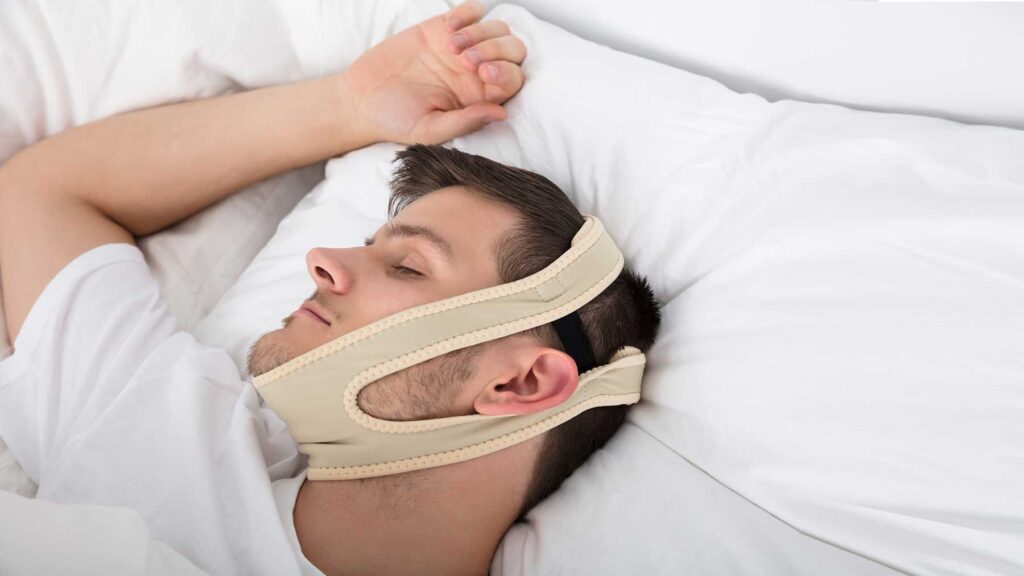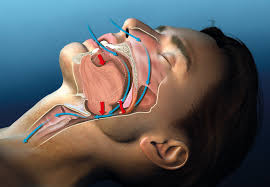How To Stop Snoring(Steps and requirements)
How To Stop Snoring: You can try altering your sleeping posture or utilizing a nasal appliance to decrease snoring. But other health issues, such as persistent allergies and sleep apnea, can contribute to snoring and call for medical attention. Enough Info

People who live in your house may become irritated by your snoring, and you may wake up feeling exhausted. If you wish to quit snoring, you can make simple lifestyle adjustments to lower your risk and take action to maintain an open airway. It’s also a good idea to discuss your snoring with your doctor because it can require medical attention.
Read Also: How To Take Care Of Your Eyes
Why do people snore?
When you breathe while you are asleep, air passes down your throat, which causes snoring. This results in harsh, possibly grating noises when the relaxed tissues in your throat vibrate.
- obstructed airways, often known as obstructive sleep apnea (OSA),
- obesity
- a problem with the way your mouth, nose, or throat are built
- sleeping too little. How To Quit Smoking(Steps and Requirements)
Other times, simply resting on your back or consuming alcohol too soon before bed can result in snoring. Being overweight, being a middle-aged or older man, or being a postmenopausal woman all increase your likelihood of snoring. With time, these nighttime noises seem to get worse.
Why does snoring happen? The sound of snoring is the result of breathing obstruction, which can be brought on by a number of common conditions, including weak muscular tone, bulky throat tissue, or a long soft palate or uvula. Additionally, it could be a warning sign that you have a medical issue that can be treated and is preventing you from breathing while you sleep, such as nasal congestion brought on by an allergy or sinus infection, nasal polyps (noncancerous growths in the nose), or a deviated septum.
But occasionally, more significant, even life-threatening health issues may be linked to snoring.
Altering one’s lifestyle
Keep a healthy weight
Weight gain might make snoring worse. Exercise and a healthy, balanced diet can help you get rid of your snoring problems.
Before starting an exercise program, see your doctor.
Healthy-weight individuals can nevertheless snore, especially if other health issues like sleep apnea are present.
Read Also: How to Stay Fit at Home
Obtain enough rest
Make sure you receive the 7-9 hours of sleep each night that people require. Your likelihood of snoring may rise if you lack sleep. This is due to the possibility that it will relax the muscles in your throat, making you more prone to airway obstruction. How To Know If You’re Depressed :
Since snoring causes disrupted sleep, it might also increase your risk of sleep deprivation.
Avoid consuming alcohol straight before sleeping.
Drinking alcohol can make it difficult to sleep. Alcohol really makes you more likely to snore since it relaxes your body. This is due to the fact that your throat muscles will likewise relax, somewhat collapsing. You will snore more as a result of this. Avoid drinking right before bed if snoring is a concern.
If you like to drink, keep your intake to no more than two serves and give yourself enough time before night to let the alcohol take effect.
Read Also: How to Stay Focused (Steps and Requirements)
Sleep on your side
Your tongue may shift to the back of your throat when you are sleeping on your back, partially obstructing the passage of air. You might only need to sleep on your side to allow air to circulate freely and lessen or stop your snoring. How To Build Muscle (Steps and Requirements)
If you must sleep on your back, raise yourself at least four inches
To elevate your sleeping position, you can either use an inclining pillow or raise the head of the bed. This lessens the tightness in the back of your throat, which decreases the likelihood that you may snore.
By keeping your airways open, raising the head of your bed a few inches may help prevent snoring. To get a little more height, you can use items like pillows or bed risers.
Give up smoking
Snoring is more likely if you smoke. Additionally, it worsens snoring. Overall, cutting up smoking can improve your ability to breathe. Talk to your doctor about prescription medicine, gum, patches, and other quitting aids if you’re having trouble quitting.
Do not overuse sedatives
Your neck muscles are relaxed by sedatives, which also affect your central nervous system. Snoring may become more likely as a result. Your risk of snoring can be decreased by avoiding them. Set up a sleep schedule if you have problems falling asleep. Before stopping any prescription drug, see your doctor.
Spend 20 minutes every day singing to help tone your voice muscles
Tightening your throat muscles can help you stop snoring because they may be the source of your problem. Singing, when done every day for at least 20 minutes, can assist your muscles to become more toned. A different option would be to play a wind instrument, such as the oboe or french horn.

Maintaining an Open Airway While Sleeping
To maintain the opening of your airways, use nasal strips or a nasal dilator.
An easy and affordable approach to keep your airways open is using over-the-counter nasal strips. They operate by securing the outside of your nostrils and yanking your nose open. Similar to this, a nasal dilator is a reusable nasal strip that you wear across your nose to aid in maintaining the opening of your airways. Both nasal strips and nasal dilators are available offline and online. Particularly if you have an underlying disease like sleep apnea, these products may not be effective for everyone.
In order to keep your airways moist, use a humidifier
Snoring can occasionally be brought on by dryness in your airways, but this issue can be resolved by maintaining moisture in them. Using a humidifier is a simple technique to prevent dryness. While you sleep, place the humidifier in your bedroom.
Read Also: How to be a Medical Doctor(Step-and Requirements)
Seeking medical treatment
To rule out any underlying medical issues, consult your doctor
Snoring can have medical repercussions when it is linked to sleep apnea. This is a dangerous disorder that has been connected to numerous health issues like depression, diabetes, high blood pressure, heart disease, and stroke. Make an appointment to talk to your doctor if you have any of the following symptoms.
- You exhibit sleep apnea indications or symptoms like:
- breathing heavily while you sleep
- Nocturia, or nighttime frequent urinating
- excessive daytime sleepiness, or hypersomnia
- waking up with a painful throat or dry mouth
- headache upon waking
- Your sleep is impacted by snoring
- Your snoring will not go away with lifestyle adjustments or home treatments.
If your problems persist despite additional therapies, get a sleep study
After making lifestyle adjustments and seeing their doctor, the majority of people will feel better. The underlying problem can, however, occasionally be more intricate. For instance, you might suffer from sleep apnea, a disease in which you briefly stop breathing before recovering on your own. To determine what is causing your snoring, your doctor could advise having a sleep study done.
- The patient finds a sleep study to be quite simple. Your physician will arrange for you to visit a sleep study clinic, where you’ll spend the night dozing asleep in a space that resembles a hotel room. You’ll be connected to a device that is barely uncomfortable and painless.
- You might be able to conduct a sleep study at home. To record your sleep data for further study, your doctor will provide you with a gadget to wear while you sleep.
If you have sleep apnea, use a CPAP machine.
A successful outcome for sleep apnea therapy is required due to the seriousness of the disorder. This not only interferes with sleep but is linked to other potentially fatal problems. To help you breathe better at night, your doctor is likely to recommend a continuous positive airway pressure (CPAP) machine.
- Use your CPAP machine every night, and make sure to adhere to your doctor’s recommendations.
- Make sure your CPAP machine is clean. Clean your mask every day, and your water chamber and tubing once a week.
- As you attempt to manage and finally cure your sleep apnea, using your CPAP machine can help you breathe more easily, snore less, and sleep better. Often, you won’t require a CPAP for the rest of your life. For more information about starting and quitting CPAP use, speak with a respiratory therapist.
If all other treatments fail, think about having surgery.
Surgery may occasionally be required to address the underlying reasons for snoring. If your doctor believes it would be best for you, they will talk about it with you. There are various options.
- In order to remove the obstruction causing your snoring, such as irritated tonsils or adenoids, the doctor may conduct a tonsillectomy or an adenoidectomy.
- The doctor may tighten or decrease your soft palate or uvula if you have sleep apnea.
Fix structural and anatomical issues with your nose
Some people have a deviated septum because it is a birth defect or a result of an injury. The obstruction to airflow is the misalignment of the wall between the two sides of the nose. Snoring can be brought on by mouth breathing while sleeping due to a deviated septum. To treat this issue, a procedure known as septoplasty may be required.
Treat chronic allergies
You may have to breathe through your mouth if allergies make it difficult for you to breathe through your nose. This makes it more likely that you will snore.
- Consult a physician to learn more about the OTC and prescription allergy drugs that may help you. They come in a number of formats, including pills, liquids, and nasal sprays.
Foods to help you stop snoring
Sleep problems like sleep apnea and insomnia, as well as exhaustion and thyroid issues, are grave health hazards associated with inadequate sleep. Obesity, heavy drinking, smoking, allergies, and sinus problems are a few of the determining variables that might cause snoring. There are various reasons why people snore. To properly address the issue, it is crucial to identify its precise root cause. Whatever the cause, making simple dietary changes will benefit anyone who is struggling with this issue.
1. Honey
Strong antimicrobic honey is frequently used to treat everyday illnesses like colds. Honey calms and unblocks nasal passageways, enabling air to flow easily. How to get rid of Sore Throat Quickly
2. Peppermint
The antispasmodic qualities of this herbal leaf help to relieve swelling in the throat and nose. Before going to bed, sip peppermint tea or breathe in steam from boiling water that has been infused with peppermint leaves or essential oil.
3. Garlic
Garlic has extraordinary anti-inflammatory qualities. To prevent common diseases, people take raw garlic cloves first thing in the morning. Additionally, some people take raw garlic at night to stop snoring.
4. Tumeric
We must consume turmeric on a daily basis. The plant is very effective at reducing nasal and throat tissue inflammation. Warm milk with a teaspoon of turmeric added should be consumed before going to bed.
5. Onions
Antioxidants found in onions fight off bacteria that can cause infections and keep the nose and throat clear of congestion.
6. Tea
While working to unblock your throat and nose, a lovely, warm cup of tea can help you unwind. However, watch out for nighttime tea consumption since the caffeine content may interfere with your ability to fall asleep. How to Get Rid of Yellow Teeth (10 Best Methods)
7. Pineapple
This fruit acts as a natural decongestant by calming the nose and throat. Pineapple can be consumed without hesitation after dinner because it is very simple to digest.
Read Also: How To Quit Smoking(Steps and Requirements)

Conclusion
Almost everyone occasionally snores. We make those loud, rattling noises while we are fast asleep without even being aware of it. Snoring seems entirely normal, except for the fact that you might get annoyed by others sleeping next to you. But it isn’t! You should be concerned if you or someone you know snores frequently. Snoring that is persistent and loud demands immediate attention.
Congestion in the nose and throat, which prevents air from passing freely, is the primary cause of snoring. When we are awake and engaged, the airway is often wide open, but not as much when our mind is closed. The disturbed and uneven airway causes the tissue walls to vibrate, which produces a grunting sound while you’re sleeping.
FAQs & Answers
Do men snore more than women?
Yes. Only 20% of women snore, compared to about 40% of men
Is it best to breathe through my mouth or nose while I sleep?
It is healthier and more peaceful to breathe via your nose. It gently distributes air, warming and humidifying it while removing potentially dangerous elements. Mouth breathing can make you more likely to snore since it constricts your airway, increases your risk of inhaling allergens and bugs, and forces air to strike the tissues that make noise directly.
Are they different snoring sounds and if so what do they mean?
Yes. Depending on the location of the vibrations and impediments, different varieties of snoring make distinct noises. Early investigations have indicated that sleep apnea-related snoring has a greater peak frequency than habitual snoring, although we are not yet able to diagnose obstructive sleep apnea solely by listening to the snoring sound.




